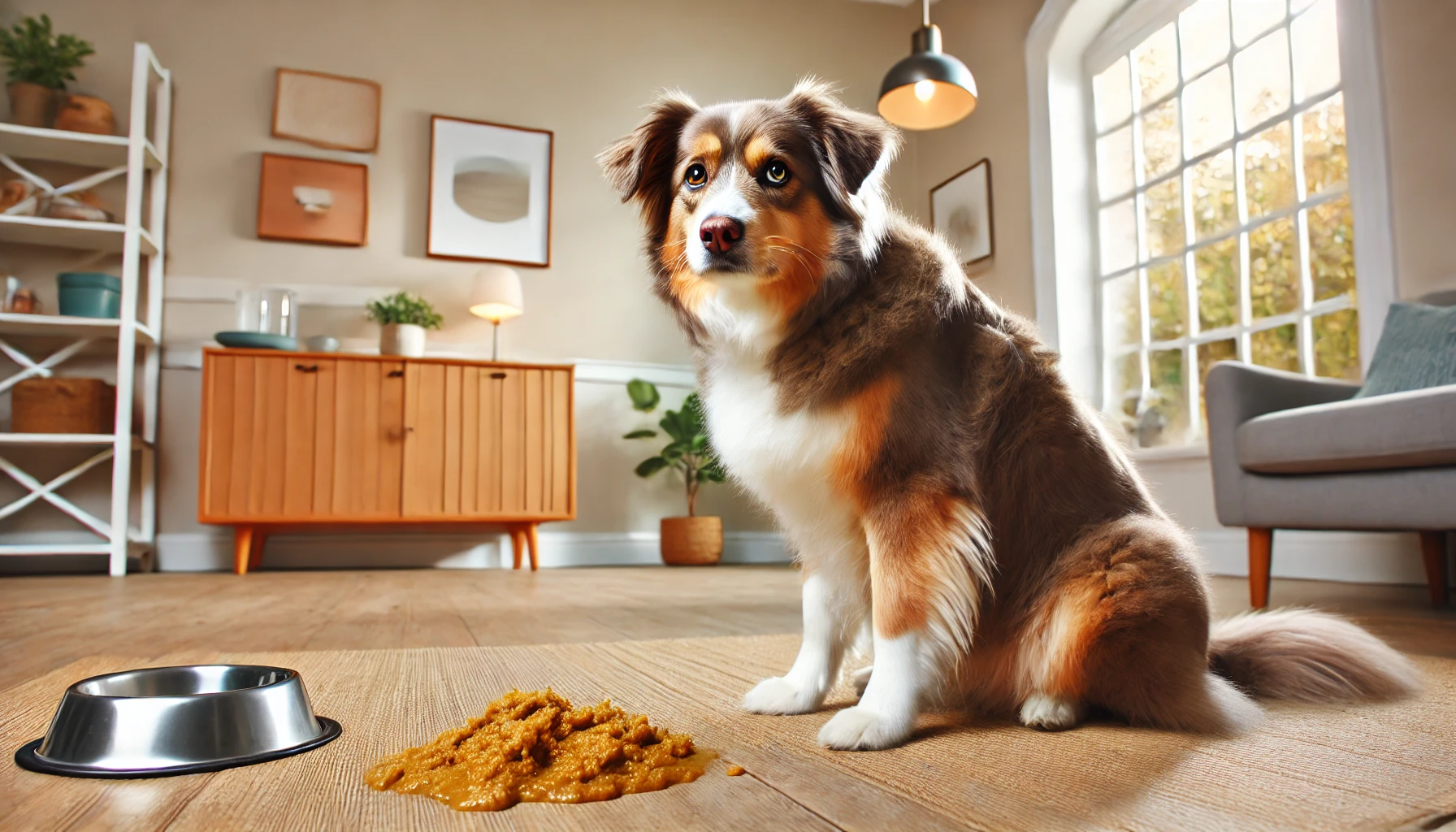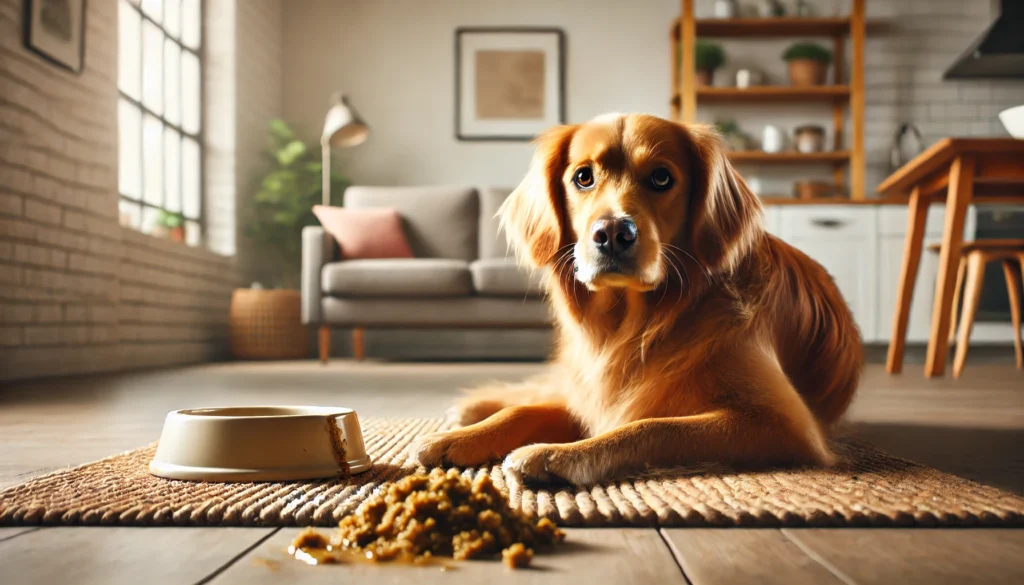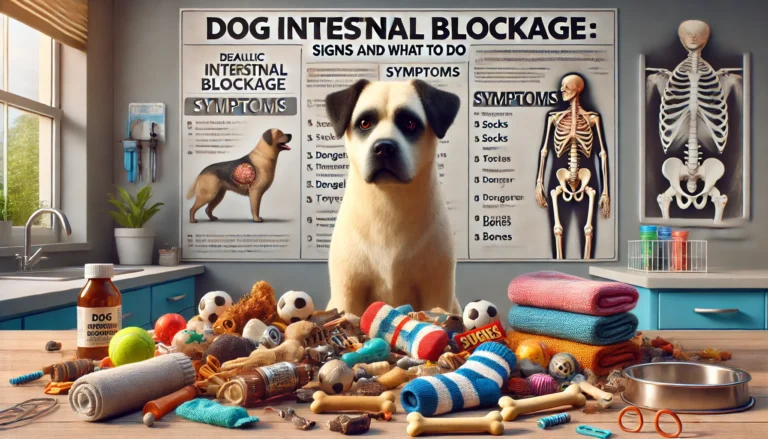Dog Regurgitation-what causes regurgitation in dogs?

what causes regurgitation in dogs? Dog regurgitation is a common but often misunderstood occurrence that can cause concern among pet owners. While many assume regurgitation and vomiting are the same thing, they have distinct differences, both in terms of cause and physical processes. Understanding these differences, potential causes, and treatments is key to ensuring your dog’s health and well-being. This guide will explore everything you need to know about dog regurgitation, its causes, symptoms, diagnosis, and treatment options.
What is Dog Regurgitation?
Regurgitation in dogs refers to the passive expulsion of undigested food or fluid from the esophagus, rather than from the stomach, as is the case with vomiting. This often happens quickly after eating or drinking and typically involves food or liquids that appear almost unchanged, whereas vomit contains bile, digestive enzymes, or partially digested food.
Key differences between regurgitation and vomiting:
- Regurgitation: Passive, undigested food or liquid expelled from the esophagus; no abdominal effort.
- Vomiting: Active, often involving abdominal heaving, expelling partially digested material.
Why Do Dogs Regurgitate? Common Causes
Understanding why dogs regurgitate is essential in determining whether it’s a minor issue or a sign of something more serious. Here are some common causes:
1. Eating Too Quickly
One of the most common reasons for dog regurgitation is eating too quickly. Some dogs eat so rapidly that their esophagus cannot process the food fast enough, causing it to be regurgitated shortly after consumption.
Treatment:
- Use slow feeder bowls
- Divide meals into smaller portions
- Avoid exercise immediately after meals
2. Esophageal Disorders
Esophageal diseases or disorders can lead to regurgitation in dogs. Conditions such as megaesophagus, which causes the esophagus to lose its ability to contract and move food to the stomach, can result in frequent regurgitation.
Treatment:
- Specialized diets for easier digestion
- Medication to aid esophageal function
- In severe cases, surgery

3. Food Intolerances or Allergies
Some dogs may regurgitate due to food allergies or intolerances. When dogs have trouble digesting certain ingredients, it may cause regurgitation as the body rejects the food.
Treatment:
- Eliminate common allergens (e.g., dairy, gluten)
- Try hypoallergenic diets
- Consult a vet for allergy testing
4. Gastric Reflux (Acid Reflux)
Similar to human acid reflux, dogs can suffer from acid reflux, which causes stomach acids to back up into the esophagus, leading to discomfort and regurgitation.
Treatment:
- Antacids prescribed by a vet
- Smaller, more frequent meals
- Avoiding rich, fatty foods
5. Infections and Parasitic Infections
In some cases, regurgitation may occur due to infections in the digestive tract or parasitic infestations. These can affect digestion and lead to regurgitation.
Treatment:
- Deworming medications
- Antibiotics (if an infection is present)
Signs of Regurgitation vs. Vomiting in Dogs
It is essential for pet owners to distinguish between regurgitation and vomiting, as the treatment and causes differ. Here’s how to recognize them:
1. Timing and Process
- Regurgitation occurs soon after eating, with little to no effort from the dog.
- Vomiting is more forceful and typically occurs some time after eating. It often involves abdominal contraction.
2. Appearance of the Expelled Material
- Regurgitation will usually look like undigested food or liquid.
- Vomiting contains bile, stomach acid, and partially digested food.
3. Behavior of the Dog
- Regurgitation: The dog may not show signs of distress, and the material is expelled without any forceful effort.
- Vomiting: The dog may show signs of nausea, salivation, and restlessness before vomiting.
When Should You Worry About Dog Regurgitation?
While regurgitation can be relatively harmless, persistent or recurrent regurgitation may indicate a more serious underlying health issue. Pet owners should seek veterinary attention if:
- Frequent regurgitation occurs, especially after every meal.
- Weight loss accompanies regurgitation.
- The dog is experiencing gagging, coughing, or difficulty breathing.
- Severe lethargy or lack of appetite is observed.
Diagnosing the Cause of Dog Regurgitation
If your dog is regurgitating frequently, it’s essential to consult your veterinarian for a proper diagnosis. Diagnostic methods may include:
1. Physical Examination
The vet will conduct a thorough physical examination, checking for any obvious signs of illness or distress.
2. X-Rays and Ultrasounds
Imaging tests like X-rays or ultrasounds help detect structural problems in the esophagus, stomach, or intestines that might be causing regurgitation.
3. Endoscopy
An endoscopic procedure may be required to look directly at the esophagus and stomach to determine if there is a blockage or structural issue.
4. Blood Tests and Fecal Analysis
Blood tests can identify infections, organ function issues, or other systemic conditions that may lead to regurgitation. Fecal tests can help identify parasites or other digestive issues.
Treatment Options for Dog Regurgitation
Treatment for dog regurgitation largely depends on the underlying cause. Here are some common treatment options:
1. Medication for Esophageal Issues
For conditions like megaesophagus, medication may be prescribed to improve esophageal function and help with digestion.
2. Dietary Adjustments
Switching to a special diet may be necessary for dogs with food intolerances or acid reflux. In cases of gastroesophageal reflux, smaller, more frequent meals, as well as low-fat, easy-to-digest food, can help.
3. Surgery
In severe cases, especially with conditions like megaesophagus or blockages, surgery might be necessary. Surgical treatments can help repair or alleviate obstructions or malformed esophageal muscles.
4. Lifestyle Changes
For dogs that eat too quickly, behavioral changes can help. Using slow-feeding bowls, ensuring dogs do not exercise immediately after meals, and spreading meals throughout the day can help prevent regurgitation.
Prevention of Dog Regurgitation
Preventing regurgitation in dogs often involves addressing the underlying causes. Here are some general prevention tips:
1. Slow Eating
Dogs that eat too quickly are more likely to regurgitate. Slow-feed bowls or puzzle feeders can encourage dogs to eat more slowly and reduce the likelihood of regurgitation.
2. Diet and Nutrition
Ensure your dog is eating a well-balanced diet, with the right amount of protein, fats, and fiber. Avoid sudden dietary changes, as they can disrupt your dog’s digestive system.
3. Prevent Stress
Stress and anxiety can sometimes trigger regurgitation. Creating a calm and comfortable eating environment can help your dog feel at ease during mealtime.
4. Regular Vet Check-ups
Regular veterinary visits allow for early detection of any health issues that could cause regurgitation, such as infections, parasites, or digestive disorders.
do you know
When a cat starts exhibiting tremors or shaking, it can be a concerning sight for any cat owner. Understanding the various causes behind why your cat is shaking is essential for determining the seriousness
The Role of Surgery in Severe Cases of Dog Regurgitation
In severe cases, such as when megaesophagus is present or when a blockage is found, surgery may be the only viable solution. Surgery is typically reserved for more serious issues, but it can be life-saving.
Megaesophagus Surgery
For dogs with megaesophagus, surgery may be required to help manage the condition. In some cases, the esophagus may be partially reconstructed or reinforced to help it function better.
Obstruction Surgery
If a foreign object or blockage is the cause of regurgitation, surgery may be necessary to remove the obstruction and restore normal digestive function.
Alternative Treatments for Dog Regurgitation
In addition to traditional veterinary care, alternative treatments such as acupuncture, herbal remedies, and dietary supplements may be used in conjunction with standard treatment to provide relief and aid in healing. However, always consult your veterinarian before starting any alternative treatments.
Conclusion:
Dog regurgitation is a common issue that, in most cases, can be easily managed with proper care and veterinary attention. Understanding the causes, symptoms, and treatment options for regurgitation will help ensure that your dog remains healthy and comfortable. With the right approach, most cases of dog regurgitation can be resolved, allowing your dog to lead a happy and healthy life.
What is dog regurgitation?
Dog regurgitation refers to the passive expulsion of undigested food or liquid from the esophagus, which typically happens shortly after eating. Unlike vomiting, which involves active muscle contractions and often results in the expulsion of partially digested food, regurgitation is a more passive process. In regurgitation, the food appears largely undigested, and it is expelled with little to no effort from the dog. Regurgitation can occur for various reasons, including eating too quickly, esophageal issues like megaesophagus, or food intolerances. It’s important for pet owners to monitor the frequency and circumstances under which this occurs to determine if the topic requires further investigation by a veterinarian.
What is animal regurgitation?
Animal regurgitation is a natural physiological process that occurs in various animals, not just dogs. It involves the expulsion of food or liquid from the esophagus, often shortly after ingestion, and is typically different from vomiting. In animals, regurgitation can happen due to several reasons, such as eating too quickly, esophageal disorders, or gastrointestinal issues. For example, some birds, reptiles, and other mammals might regurgitate food for various reasons, including to feed their young or due to illness. The topic of animal regurgitation spans across different species, each with its unique causes, but in general, regurgitation is a non-forceful expulsion of food that hasn’t been fully digested.
Can anxiety cause regurgitation in dogs?
Yes, anxiety can sometimes cause dog regurgitation. Dogs that experience high levels of stress or anxiety may exhibit gastrointestinal disturbances, including regurgitation. The stress response can affect their digestion by altering normal stomach functions, leading to issues with food processing and the relaxation of the esophageal muscles. This can cause food to move back up the esophagus and be expelled, even if the dog hasn’t vomited. Stress-triggered regurgitation is typically linked to stressful events such as separation anxiety, travel, or sudden changes in their environment. Understanding the topic of anxiety-related regurgitation is crucial for pet owners, as treating the root cause—such as reducing stress or anxiety—can help alleviate these symptoms.
How to differentiate regurgitation and vomiting?
Differentiating regurgitation from vomiting is important in determining the cause and appropriate treatment for your dog’s condition. Regurgitation is typically passive and happens quickly after eating. The food or liquid is expelled with little to no effort and appears largely undigested. In contrast, vomiting is an active process that usually involves abdominal contractions, and the expelled material is often mixed with bile and stomach acids, indicating it has been processed by the stomach. Vomiting may also be preceded by signs of nausea, such as drooling, pacing, or swallowing. Understanding the topic of regurgitation vs. vomiting can help in diagnosing the underlying issue and seeking appropriate veterinary care.
Should I feed my dog after regurgitation?
Feeding your dog immediately after regurgitation is not recommended. It’s important to allow your dog’s digestive system time to settle before offering food again. If the regurgitation was a one-time occurrence and your dog seems fine afterward, wait a few hours before offering a small meal. However, if regurgitation happens frequently, it could indicate an underlying health issue, such as an esophageal disorder, food intolerance, or stress-related symptoms, which may require a change in diet or medical intervention. Always consult with a veterinarian if the topic of regurgitation becomes a recurring concern to ensure the dog’s health and avoid further digestive disturbances.






